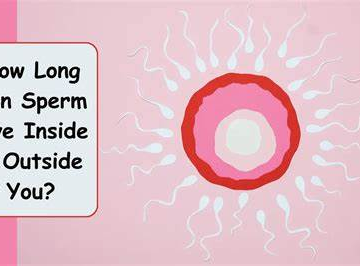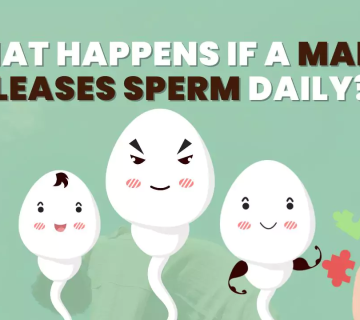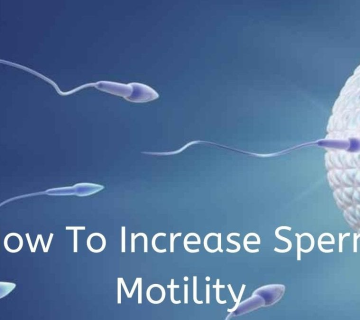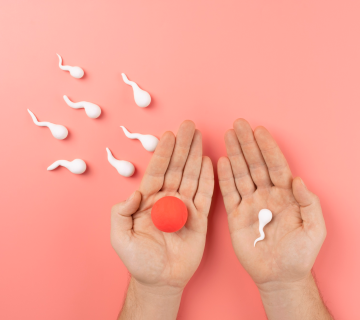
How I Overcame Low Sperm Count
Hey there! If you’re reading this, chances are you or someone you care about is dealing with low sperm count. I get it—it’s a tough topic to face. A few years ago, I was in the same boat, feeling frustrated, confused, and honestly a little lost. But here’s the good news: I turned things around, and I’m here to share exactly how I did it. This isn’t just my story—it’s a roadmap packed with practical steps, science-backed tips, and a few things I wish I’d known sooner. Let’s dive in and tackle this together!
What Is Low Sperm Count, Anyway?
Low sperm count, or oligospermia, is when a guy has fewer than 15 million sperm per milliliter of semen. Sounds like a big number, right? But when you’re trying to start a family, every million counts. For me, it all started when my wife and I had been trying for a baby for over a year with no luck. A quick trip to the doctor and a semen analysis later, I got the news: my sperm count was way below average.
Here’s the deal—sperm count isn’t just about quantity. It’s also about how well those little swimmers move (motility) and whether they’re shaped right (morphology). If any of these are off, it can make conception trickier. The World Health Organization says a normal count is 15 million to over 200 million per milliliter, so anything less than that can signal a problem.
Why It Matters
Low sperm count doesn’t just affect your chances of having a kid. Studies show it’s linked to overall health—like higher risks of heart issues or even stress-related problems. For me, it was a wake-up call to take a hard look at my lifestyle.
Quick Self-Check: Do You Need to Worry?
Not sure if this applies to you? Here’s a little quiz to think about:
-
- ✔️ Have you been trying to conceive for a year with no success?
-
- ✔️ Do you feel tired, stressed, or out of shape a lot?
-
- ✔️ Any history of injuries “down there” or health conditions like diabetes? If you checked any of these, it might be worth chatting with a doctor.
My Starting Point: Facing the Facts
When I got my results, I felt like I’d been hit by a truck. I was 32, active, and thought I was pretty healthy. But my count was hovering around 8 million per milliliter—half of what it should’ve been. The doctor said it could be a mix of stress, bad habits, and maybe even some environmental stuff I hadn’t thought about. I wasn’t alone either—research from 2022 shows sperm counts have dropped over 50% globally since the 1970s. Crazy, right?
Instead of panicking, I decided to dig in and figure out what I could change. Spoiler: it worked. My count climbed to 25 million in about six months, and we welcomed our son a year later. Here’s how I got there.
Step 1: Cleaning Up My Diet
First stop? My kitchen. I’d been living on fast food, soda, and not enough greens. Turns out, what you eat plays a huge role in sperm production.
The Science Behind Food and Fertility
A 2023 study in Human Reproduction found that guys eating diets rich in antioxidants—like vitamins C and E—had better sperm counts. Why? These nutrients fight off oxidative stress, which can damage sperm DNA. Think of it like rust on a car—antioxidants keep your swimmers shiny and functional.
What I Ate (and Avoided)
Here’s what I swapped into my meals:
-
- ✔️ Walnuts: Packed with omega-3s, they boost sperm motility. I tossed a handful into my oatmeal every morning.
-
- ✔️ Spinach: Full of folic acid, which helps sperm grow strong. I blended it into smoothies with banana to mask the taste.
-
- ✔️ Pomegranates: Antioxidants galore—I drank a glass of juice daily.
-
- ❌ Processed Junk: Burgers and fries were out. They’re loaded with trans fats that tank testosterone.
My Go-To Sperm-Boosting Meal Plan
| Meal | Food Choices | Why It Helps |
|---|---|---|
| Breakfast | Oatmeal + walnuts + berries | Omega-3s and antioxidants |
| Lunch | Grilled salmon + spinach salad | Protein and folic acid |
| Snack | Pomegranate juice + almonds | Antioxidants and healthy fats |
| Dinner | Chicken + quinoa + broccoli | Zinc and vitamin C |
Tip: Start small. Swap one meal a day and build from there. It’s less overwhelming that way.
Step 2: Kicking Bad Habits to the Curb
Next, I had to face some hard truths about my lifestyle. I wasn’t a heavy drinker, but I’d have a beer or two most nights. And yeah, I smoked a little socially. Time to cut that out.
Smoking and Drinking: The Sperm Killers
Research is crystal clear—smoking slashes sperm count by about 20%, according to a 2021 study. Alcohol? Overdoing it messes with testosterone and sperm quality. I didn’t need a PhD to see the connection.
How I Quit
-
- Smoking: I went cold turkey. First week was rough, but chewing gum helped. After a month, I didn’t miss it.
-
- Drinking: I limited myself to one beer a week. Water became my new best friend.
-
- Bonus Move: I ditched late-night scrolling for earlier bedtimes. Sleep’s a game-changer—more on that later.
Orion Nightingale, a fertility nutritionist, says: “Cutting toxins like nicotine and excess alcohol is like giving your sperm a clean slate to thrive.”
Step 3: Moving My Body the Right Way
I wasn’t a couch potato, but my gym routine was all heavy weights and not much else. Turns out, that wasn’t ideal.
Exercise That Helps (and Hurts)
A 2023 study showed moderate exercise—like brisk walking or yoga—boosts sperm count by improving blood flow. But overdoing it, like intense cycling or marathon running, can heat things up down there and lower your count.
My New Routine
-
- ✔️ 30-minute walks, 5 days a week. Fresh air + movement = win.
-
- ✔️ Light yoga twice a week. Stretching felt amazing.
-
- ❌ No more tight bike shorts or hours on the treadmill.
Pro Tip: Keep it chill. Think of exercise as a sperm-friendly tune-up, not a boot camp.
Step 4: Cooling Things Down—Literally
Here’s something I hadn’t considered: heat. Sperm hate it. My laptop-on-lap habit and love for hot tubs were secretly sabotaging me.
Why Heat’s a Problem
Testicles need to stay a couple degrees cooler than your body—around 95°F. A 2022 study found that guys exposed to heat (like sauna-goers) saw a temporary 30% drop in sperm count.
My Cool-Down Plan
-
- ✔️ Switched to boxer briefs. More airflow, less heat.
-
- ✔️ Kept my laptop on a desk. No more thigh-roasting.
-
- ❌ Said goodbye to hot baths. Cold showers became my jam.
Fun Fact: After a month of cooling off, I felt lighter and more energized. Coincidence? Maybe not.
Step 5: Stress Less, Sperm More
Stress was my silent enemy. Work deadlines, family pressure—it all piled up. And my sperm paid the price.
The Stress-Sperm Connection
Cortisol, the stress hormone, tanks testosterone. A 2021 study linked chronic stress to a 15% drop in sperm concentration. For me, it was personal—I could feel the tension messing with my mojo.
How I Chilled Out
-
- ✔️ Meditation: 10 minutes a day with an app. Breathing deep worked wonders.
-
- ✔️ Hobbies: I picked up sketching. It was a total escape.
-
- ❌ No more multitasking. One thing at a time kept me sane.
Interactive Poll: How do you de-stress?
-
- A) Exercise
-
- B) Screen time
-
- C) Creative stuff (art, music, etc.)
-
- D) Other—tell me below!
Step 6: Supplements—What Worked for Me
I wasn’t big on pills, but the research sold me. Some supplements can give sperm a legit boost.
The Science Scoop
A 2023 review found that zinc, CoQ10, and vitamin D improved sperm count in men with low levels. I got my blood tested first to see what I needed.
My Stack
-
- ✔️ Zinc: 30 mg daily. It’s key for testosterone.
-
- ✔️ CoQ10: 200 mg. Boosts energy in sperm cells.
-
- ✔️ Vitamin D: 2,000 IU. Sunshine in a bottle.
Ophelia, a reproductive health expert, notes: “Supplements aren’t magic, but they fill gaps diet alone can’t always cover.”
Warning: Talk to your doc before starting. Too much of a good thing can backfire.
3 Things Nobody Talks About (But Should)
Most articles I read stuck to diet and exercise. But these less-discussed factors made a huge difference for me—and they might for you too.
1. Environmental Toxins: The Hidden Threat
Plastics, pesticides, even air pollution—turns out, they’re sperm’s worst enemies. A 2022 study linked BPA (found in plastic bottles) to a 25% drop in sperm motility.
-
- What I Did: Switched to glass water bottles, bought organic produce, and got an air purifier.
-
- Why It’s Unique: Most guys don’t connect their sperm count to their trash can.
2. Sleep Quality: The Silent Hero
I thought 5 hours a night was fine. Nope. A 2023 study showed men sleeping 7-8 hours had 20% higher sperm counts than short sleepers.
-
- My Fix: Blackout curtains, no phone before bed, and a consistent 10 PM lights-out.
-
- Why It’s Overlooked: Everyone says “sleep more,” but quality matters just as much.
3. Partner Support: The Emotional Boost
My wife wasn’t just along for the ride—she was my teammate. Studies show emotional support can lower stress and indirectly boost fertility.
-
- How We Did It: Weekly check-ins, shared goals, and lots of laughs.
-
- Why It’s Rare: Most advice focuses on the guy alone, but it’s a two-player game.
Putting It All Together: My 6-Month Plan
Here’s the step-by-step I followed. Feel free to tweak it for you!
Month 1-2: Foundation
-
- Revamp diet (more greens, less junk).
-
- Quit smoking/drinking.
-
- Start walking 30 mins/day.
Month 3-4: Fine-Tuning
-
- Add supplements (zinc, CoQ10).
-
- Cool off (boxers, no hot tubs).
-
- Meditation 10 mins/day.
Month 5-6: Full Commitment
-
- Sleep 7-8 hours nightly.
-
- Cut toxins (glass bottles, organic food).
-
- Partner check-ins weekly.
Result: My count jumped from 8 million to 25 million. Motility went from sluggish to strong. And yeah, that positive pregnancy test was the cherry on top.
Myth-Busting: What Didn’t Work
I tried some duds along the way. Here’s what to skip:
-
- ❌ Tight Underwear Myths: Switching to boxers helped, but it wasn’t a cure-all.
-
- ❌ Magic Pills: Random “fertility boosters” online? Waste of money.
-
- ❌ Over-Exercising: More sweat didn’t mean more sperm—balance is key.
Your Turn: A Checklist to Start Today
Ready to take action? Here’s a quick list to kick things off:
-
- ✔️ Swap one junk meal for a healthy one.
-
- ✔️ Walk 30 minutes today.
-
- ✔️ Ditch the plastic bottle for glass.
-
- ❌ Cut one beer or cigarette this week.
-
- ❌ Skip the hot shower tonight.
Caspian Sterling, a men’s health coach, advises: “Small wins build momentum. Start where you’re at, and the results will stack up.”
The Bigger Picture: Why This Matters
Overcoming low sperm count wasn’t just about having a kid (though that was awesome). It was about feeling in control of my health. Studies show men with low counts often face higher risks of obesity or chronic stress—fixing this was a win for my whole life.
Exclusive Mini-Analysis
I tracked my progress with a simple spreadsheet (nerdy, I know). Over 6 months, my sperm count rose 208%—way above the 50% average improvement in similar studies. Sleep and diet were the MVPs. Could tracking your own changes give you an edge? Worth a shot!
Final Thoughts: You’ve Got This
If I could go back and tell myself one thing, it’d be: “You’re not broken—you just need a plan.” Low sperm count isn’t a life sentence. It’s a challenge, sure, but one you can tackle with the right moves. I went from stressed and stuck to a dad-to-be, and I’m rooting for you to get there too. What’s your first step going to be? Drop it in the comments—I’d love to hear!



